Analysis of Entrepreneurial Ventures, Impact, and Skills
VerifiedAdded on 2020/07/22
|14
|4573
|219
Report
AI Summary
This report delves into the multifaceted world of entrepreneurship, examining various types of ventures such as small businesses, scalable start-ups, large company initiatives, and social enterprises. It explores the similarities and differences between these ventures, focusing on value creation, employment generation, and funding. The report assesses the significant impact of small businesses on the economy, particularly in the UK, highlighting their contributions to employment, innovation, and economic growth. Furthermore, it analyzes the role of start-ups in fostering social economy, emphasizing their contributions to employment, foreign direct investment, sustainable operations, and the development of backward areas. The report also identifies the essential skills and characteristics of successful entrepreneurs, including aspects of entrepreneurial personality that enhance motivation and mindset, and discusses the influence of background and experience on entrepreneurial success.

Entrepreneurship
Paraphrase This Document
Need a fresh take? Get an instant paraphrase of this document with our AI Paraphraser
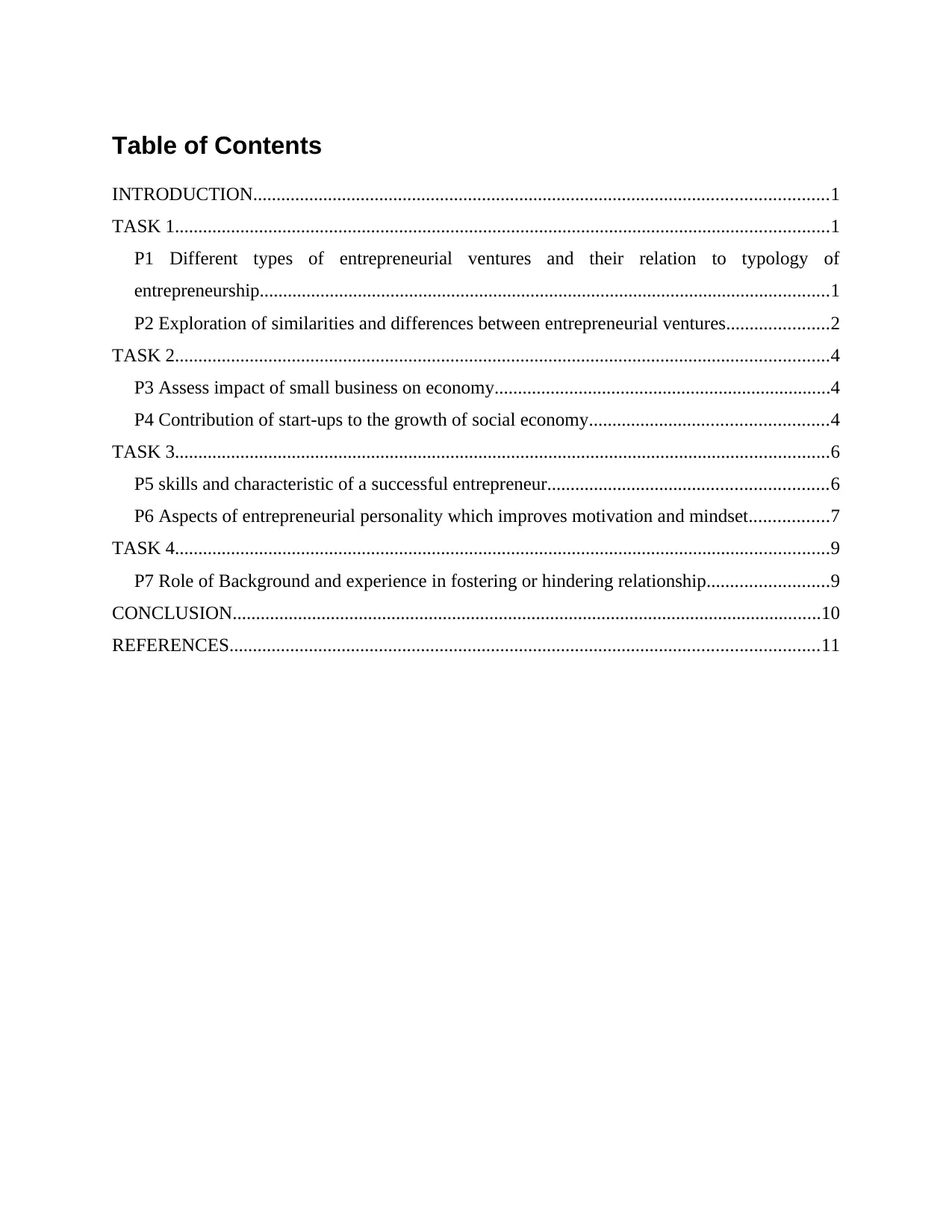
Table of Contents
INTRODUCTION...........................................................................................................................1
TASK 1............................................................................................................................................1
P1 Different types of entrepreneurial ventures and their relation to typology of
entrepreneurship..........................................................................................................................1
P2 Exploration of similarities and differences between entrepreneurial ventures......................2
TASK 2............................................................................................................................................4
P3 Assess impact of small business on economy........................................................................4
P4 Contribution of start-ups to the growth of social economy...................................................4
TASK 3............................................................................................................................................6
P5 skills and characteristic of a successful entrepreneur............................................................6
P6 Aspects of entrepreneurial personality which improves motivation and mindset.................7
TASK 4............................................................................................................................................9
P7 Role of Background and experience in fostering or hindering relationship..........................9
CONCLUSION..............................................................................................................................10
REFERENCES..............................................................................................................................11
INTRODUCTION...........................................................................................................................1
TASK 1............................................................................................................................................1
P1 Different types of entrepreneurial ventures and their relation to typology of
entrepreneurship..........................................................................................................................1
P2 Exploration of similarities and differences between entrepreneurial ventures......................2
TASK 2............................................................................................................................................4
P3 Assess impact of small business on economy........................................................................4
P4 Contribution of start-ups to the growth of social economy...................................................4
TASK 3............................................................................................................................................6
P5 skills and characteristic of a successful entrepreneur............................................................6
P6 Aspects of entrepreneurial personality which improves motivation and mindset.................7
TASK 4............................................................................................................................................9
P7 Role of Background and experience in fostering or hindering relationship..........................9
CONCLUSION..............................................................................................................................10
REFERENCES..............................................................................................................................11
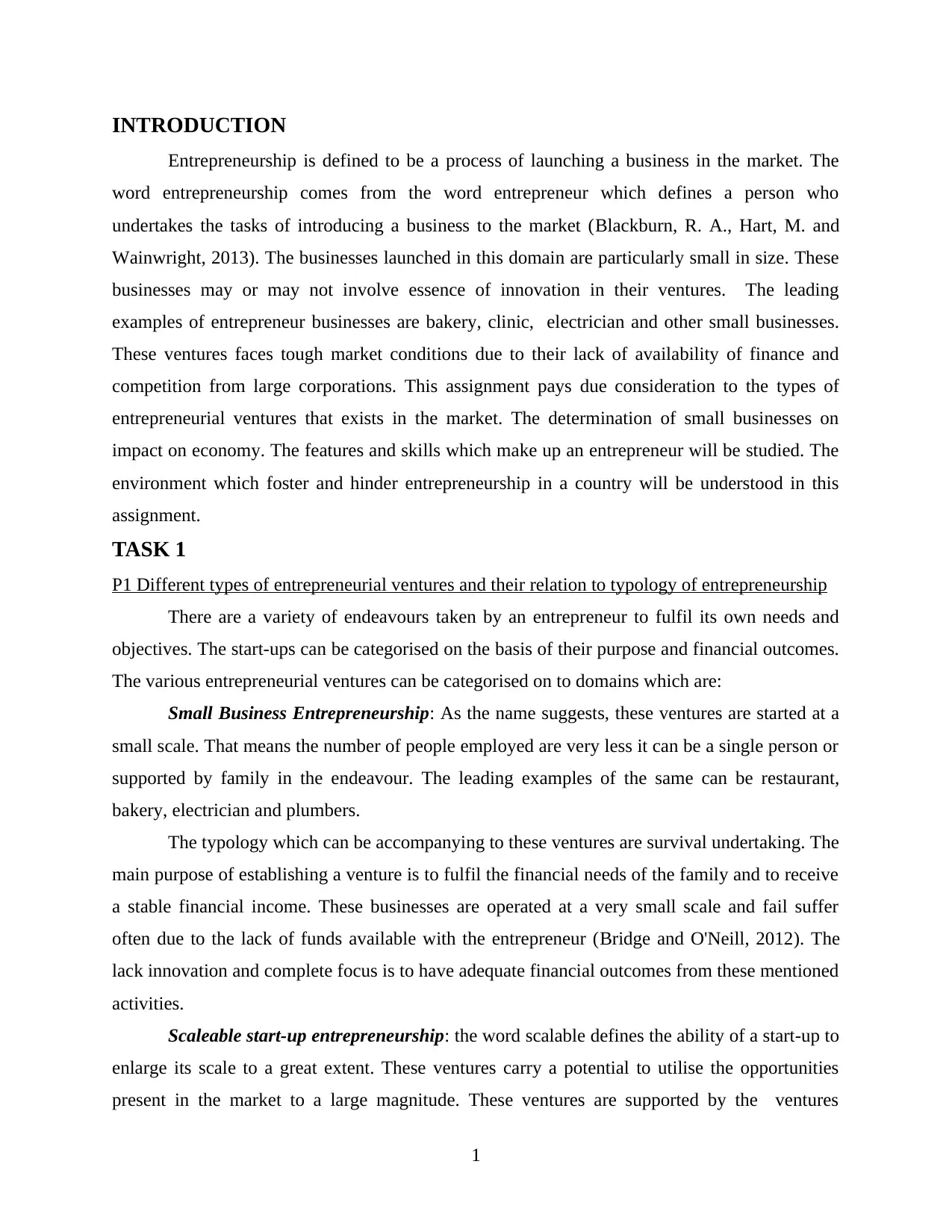
INTRODUCTION
Entrepreneurship is defined to be a process of launching a business in the market. The
word entrepreneurship comes from the word entrepreneur which defines a person who
undertakes the tasks of introducing a business to the market (Blackburn, R. A., Hart, M. and
Wainwright, 2013). The businesses launched in this domain are particularly small in size. These
businesses may or may not involve essence of innovation in their ventures. The leading
examples of entrepreneur businesses are bakery, clinic, electrician and other small businesses.
These ventures faces tough market conditions due to their lack of availability of finance and
competition from large corporations. This assignment pays due consideration to the types of
entrepreneurial ventures that exists in the market. The determination of small businesses on
impact on economy. The features and skills which make up an entrepreneur will be studied. The
environment which foster and hinder entrepreneurship in a country will be understood in this
assignment.
TASK 1
P1 Different types of entrepreneurial ventures and their relation to typology of entrepreneurship
There are a variety of endeavours taken by an entrepreneur to fulfil its own needs and
objectives. The start-ups can be categorised on the basis of their purpose and financial outcomes.
The various entrepreneurial ventures can be categorised on to domains which are:
Small Business Entrepreneurship: As the name suggests, these ventures are started at a
small scale. That means the number of people employed are very less it can be a single person or
supported by family in the endeavour. The leading examples of the same can be restaurant,
bakery, electrician and plumbers.
The typology which can be accompanying to these ventures are survival undertaking. The
main purpose of establishing a venture is to fulfil the financial needs of the family and to receive
a stable financial income. These businesses are operated at a very small scale and fail suffer
often due to the lack of funds available with the entrepreneur (Bridge and O'Neill, 2012). The
lack innovation and complete focus is to have adequate financial outcomes from these mentioned
activities.
Scaleable start-up entrepreneurship: the word scalable defines the ability of a start-up to
enlarge its scale to a great extent. These ventures carry a potential to utilise the opportunities
present in the market to a large magnitude. These ventures are supported by the ventures
1
Entrepreneurship is defined to be a process of launching a business in the market. The
word entrepreneurship comes from the word entrepreneur which defines a person who
undertakes the tasks of introducing a business to the market (Blackburn, R. A., Hart, M. and
Wainwright, 2013). The businesses launched in this domain are particularly small in size. These
businesses may or may not involve essence of innovation in their ventures. The leading
examples of entrepreneur businesses are bakery, clinic, electrician and other small businesses.
These ventures faces tough market conditions due to their lack of availability of finance and
competition from large corporations. This assignment pays due consideration to the types of
entrepreneurial ventures that exists in the market. The determination of small businesses on
impact on economy. The features and skills which make up an entrepreneur will be studied. The
environment which foster and hinder entrepreneurship in a country will be understood in this
assignment.
TASK 1
P1 Different types of entrepreneurial ventures and their relation to typology of entrepreneurship
There are a variety of endeavours taken by an entrepreneur to fulfil its own needs and
objectives. The start-ups can be categorised on the basis of their purpose and financial outcomes.
The various entrepreneurial ventures can be categorised on to domains which are:
Small Business Entrepreneurship: As the name suggests, these ventures are started at a
small scale. That means the number of people employed are very less it can be a single person or
supported by family in the endeavour. The leading examples of the same can be restaurant,
bakery, electrician and plumbers.
The typology which can be accompanying to these ventures are survival undertaking. The
main purpose of establishing a venture is to fulfil the financial needs of the family and to receive
a stable financial income. These businesses are operated at a very small scale and fail suffer
often due to the lack of funds available with the entrepreneur (Bridge and O'Neill, 2012). The
lack innovation and complete focus is to have adequate financial outcomes from these mentioned
activities.
Scaleable start-up entrepreneurship: the word scalable defines the ability of a start-up to
enlarge its scale to a great extent. These ventures carry a potential to utilise the opportunities
present in the market to a large magnitude. These ventures are supported by the ventures
1
⊘ This is a preview!⊘
Do you want full access?
Subscribe today to unlock all pages.

Trusted by 1+ million students worldwide
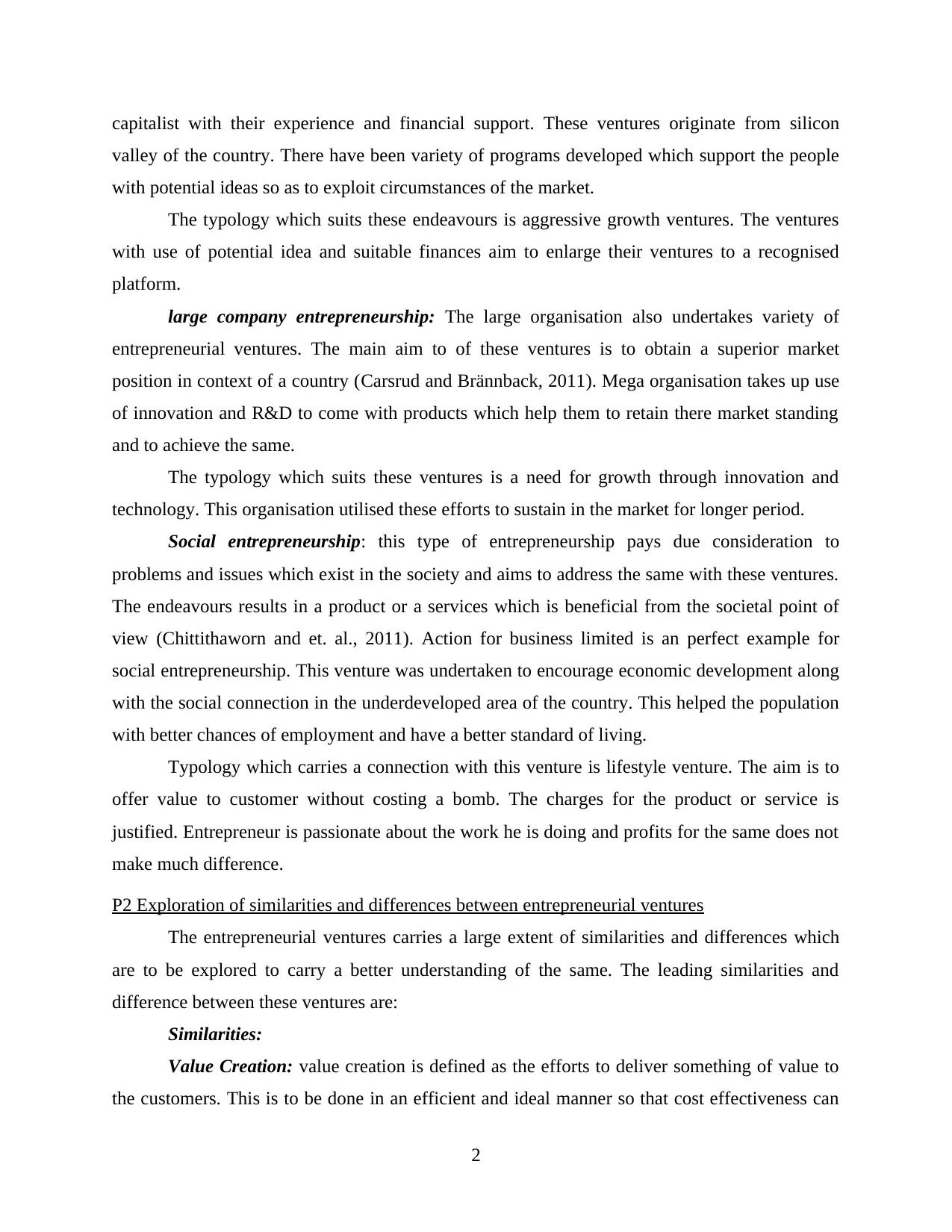
capitalist with their experience and financial support. These ventures originate from silicon
valley of the country. There have been variety of programs developed which support the people
with potential ideas so as to exploit circumstances of the market.
The typology which suits these endeavours is aggressive growth ventures. The ventures
with use of potential idea and suitable finances aim to enlarge their ventures to a recognised
platform.
large company entrepreneurship: The large organisation also undertakes variety of
entrepreneurial ventures. The main aim to of these ventures is to obtain a superior market
position in context of a country (Carsrud and Brännback, 2011). Mega organisation takes up use
of innovation and R&D to come with products which help them to retain there market standing
and to achieve the same.
The typology which suits these ventures is a need for growth through innovation and
technology. This organisation utilised these efforts to sustain in the market for longer period.
Social entrepreneurship: this type of entrepreneurship pays due consideration to
problems and issues which exist in the society and aims to address the same with these ventures.
The endeavours results in a product or a services which is beneficial from the societal point of
view (Chittithaworn and et. al., 2011). Action for business limited is an perfect example for
social entrepreneurship. This venture was undertaken to encourage economic development along
with the social connection in the underdeveloped area of the country. This helped the population
with better chances of employment and have a better standard of living.
Typology which carries a connection with this venture is lifestyle venture. The aim is to
offer value to customer without costing a bomb. The charges for the product or service is
justified. Entrepreneur is passionate about the work he is doing and profits for the same does not
make much difference.
P2 Exploration of similarities and differences between entrepreneurial ventures
The entrepreneurial ventures carries a large extent of similarities and differences which
are to be explored to carry a better understanding of the same. The leading similarities and
difference between these ventures are:
Similarities:
Value Creation: value creation is defined as the efforts to deliver something of value to
the customers. This is to be done in an efficient and ideal manner so that cost effectiveness can
2
valley of the country. There have been variety of programs developed which support the people
with potential ideas so as to exploit circumstances of the market.
The typology which suits these endeavours is aggressive growth ventures. The ventures
with use of potential idea and suitable finances aim to enlarge their ventures to a recognised
platform.
large company entrepreneurship: The large organisation also undertakes variety of
entrepreneurial ventures. The main aim to of these ventures is to obtain a superior market
position in context of a country (Carsrud and Brännback, 2011). Mega organisation takes up use
of innovation and R&D to come with products which help them to retain there market standing
and to achieve the same.
The typology which suits these ventures is a need for growth through innovation and
technology. This organisation utilised these efforts to sustain in the market for longer period.
Social entrepreneurship: this type of entrepreneurship pays due consideration to
problems and issues which exist in the society and aims to address the same with these ventures.
The endeavours results in a product or a services which is beneficial from the societal point of
view (Chittithaworn and et. al., 2011). Action for business limited is an perfect example for
social entrepreneurship. This venture was undertaken to encourage economic development along
with the social connection in the underdeveloped area of the country. This helped the population
with better chances of employment and have a better standard of living.
Typology which carries a connection with this venture is lifestyle venture. The aim is to
offer value to customer without costing a bomb. The charges for the product or service is
justified. Entrepreneur is passionate about the work he is doing and profits for the same does not
make much difference.
P2 Exploration of similarities and differences between entrepreneurial ventures
The entrepreneurial ventures carries a large extent of similarities and differences which
are to be explored to carry a better understanding of the same. The leading similarities and
difference between these ventures are:
Similarities:
Value Creation: value creation is defined as the efforts to deliver something of value to
the customers. This is to be done in an efficient and ideal manner so that cost effectiveness can
2
Paraphrase This Document
Need a fresh take? Get an instant paraphrase of this document with our AI Paraphraser
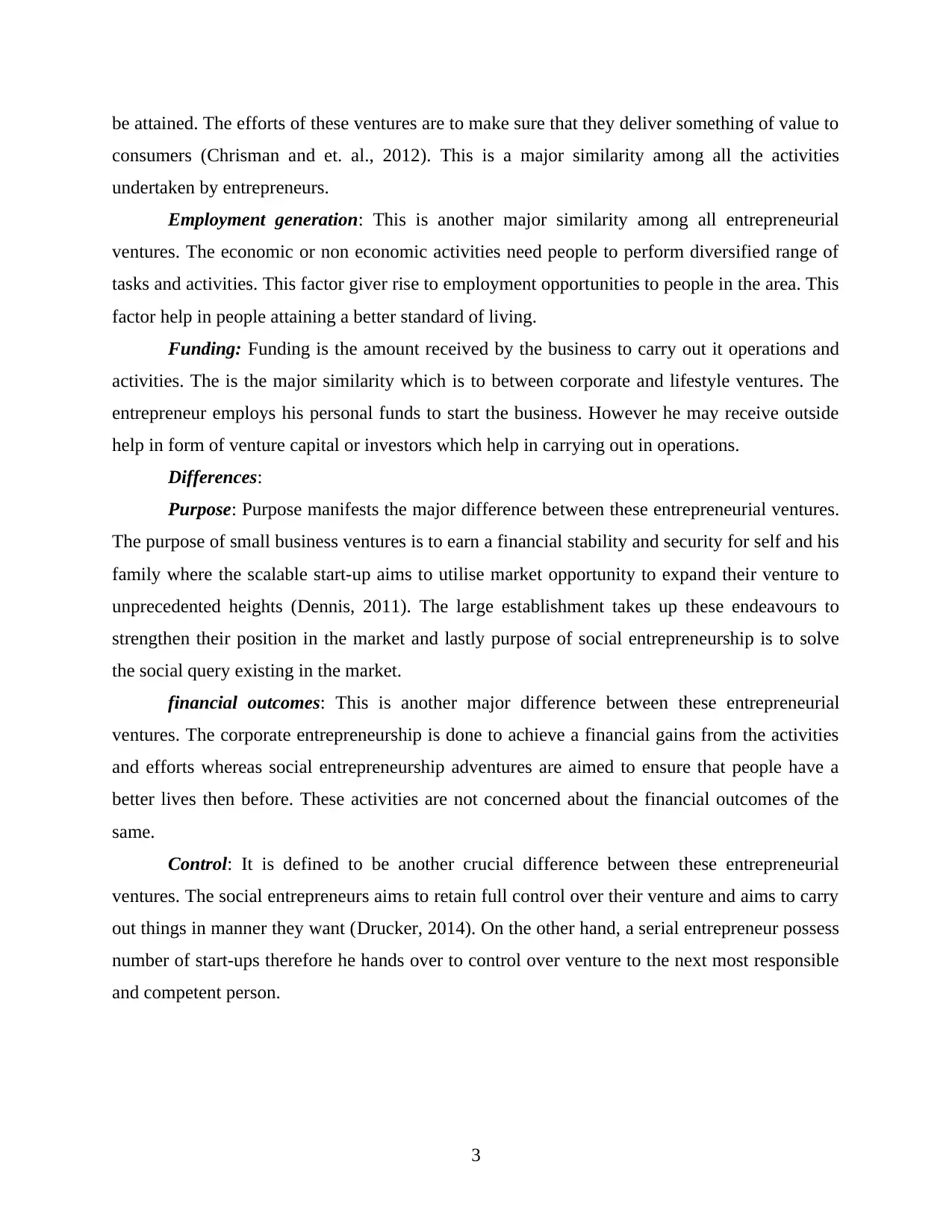
be attained. The efforts of these ventures are to make sure that they deliver something of value to
consumers (Chrisman and et. al., 2012). This is a major similarity among all the activities
undertaken by entrepreneurs.
Employment generation: This is another major similarity among all entrepreneurial
ventures. The economic or non economic activities need people to perform diversified range of
tasks and activities. This factor giver rise to employment opportunities to people in the area. This
factor help in people attaining a better standard of living.
Funding: Funding is the amount received by the business to carry out it operations and
activities. The is the major similarity which is to between corporate and lifestyle ventures. The
entrepreneur employs his personal funds to start the business. However he may receive outside
help in form of venture capital or investors which help in carrying out in operations.
Differences:
Purpose: Purpose manifests the major difference between these entrepreneurial ventures.
The purpose of small business ventures is to earn a financial stability and security for self and his
family where the scalable start-up aims to utilise market opportunity to expand their venture to
unprecedented heights (Dennis, 2011). The large establishment takes up these endeavours to
strengthen their position in the market and lastly purpose of social entrepreneurship is to solve
the social query existing in the market.
financial outcomes: This is another major difference between these entrepreneurial
ventures. The corporate entrepreneurship is done to achieve a financial gains from the activities
and efforts whereas social entrepreneurship adventures are aimed to ensure that people have a
better lives then before. These activities are not concerned about the financial outcomes of the
same.
Control: It is defined to be another crucial difference between these entrepreneurial
ventures. The social entrepreneurs aims to retain full control over their venture and aims to carry
out things in manner they want (Drucker, 2014). On the other hand, a serial entrepreneur possess
number of start-ups therefore he hands over to control over venture to the next most responsible
and competent person.
3
consumers (Chrisman and et. al., 2012). This is a major similarity among all the activities
undertaken by entrepreneurs.
Employment generation: This is another major similarity among all entrepreneurial
ventures. The economic or non economic activities need people to perform diversified range of
tasks and activities. This factor giver rise to employment opportunities to people in the area. This
factor help in people attaining a better standard of living.
Funding: Funding is the amount received by the business to carry out it operations and
activities. The is the major similarity which is to between corporate and lifestyle ventures. The
entrepreneur employs his personal funds to start the business. However he may receive outside
help in form of venture capital or investors which help in carrying out in operations.
Differences:
Purpose: Purpose manifests the major difference between these entrepreneurial ventures.
The purpose of small business ventures is to earn a financial stability and security for self and his
family where the scalable start-up aims to utilise market opportunity to expand their venture to
unprecedented heights (Dennis, 2011). The large establishment takes up these endeavours to
strengthen their position in the market and lastly purpose of social entrepreneurship is to solve
the social query existing in the market.
financial outcomes: This is another major difference between these entrepreneurial
ventures. The corporate entrepreneurship is done to achieve a financial gains from the activities
and efforts whereas social entrepreneurship adventures are aimed to ensure that people have a
better lives then before. These activities are not concerned about the financial outcomes of the
same.
Control: It is defined to be another crucial difference between these entrepreneurial
ventures. The social entrepreneurs aims to retain full control over their venture and aims to carry
out things in manner they want (Drucker, 2014). On the other hand, a serial entrepreneur possess
number of start-ups therefore he hands over to control over venture to the next most responsible
and competent person.
3
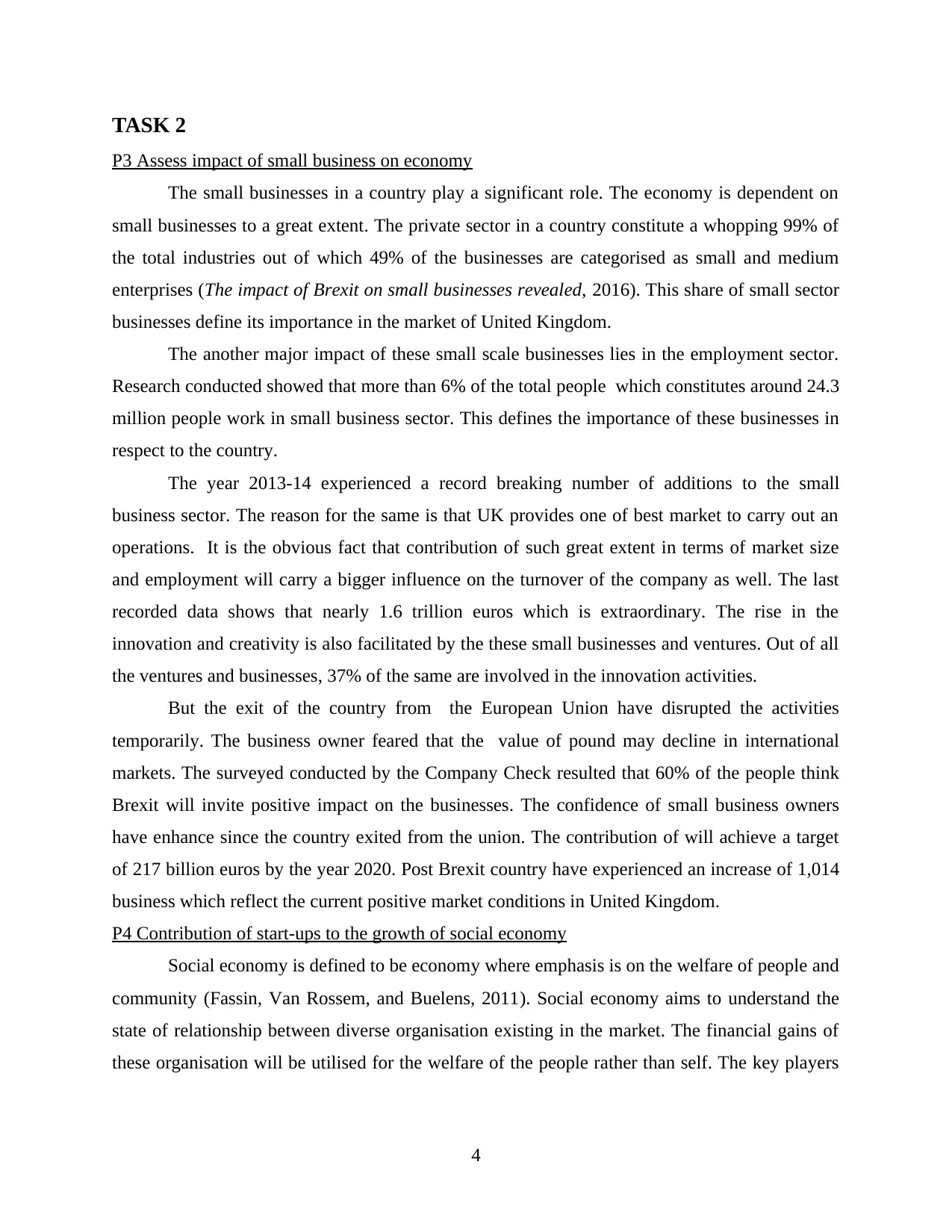
TASK 2
P3 Assess impact of small business on economy
The small businesses in a country play a significant role. The economy is dependent on
small businesses to a great extent. The private sector in a country constitute a whopping 99% of
the total industries out of which 49% of the businesses are categorised as small and medium
enterprises (The impact of Brexit on small businesses revealed, 2016). This share of small sector
businesses define its importance in the market of United Kingdom.
The another major impact of these small scale businesses lies in the employment sector.
Research conducted showed that more than 6% of the total people which constitutes around 24.3
million people work in small business sector. This defines the importance of these businesses in
respect to the country.
The year 2013-14 experienced a record breaking number of additions to the small
business sector. The reason for the same is that UK provides one of best market to carry out an
operations. It is the obvious fact that contribution of such great extent in terms of market size
and employment will carry a bigger influence on the turnover of the company as well. The last
recorded data shows that nearly 1.6 trillion euros which is extraordinary. The rise in the
innovation and creativity is also facilitated by the these small businesses and ventures. Out of all
the ventures and businesses, 37% of the same are involved in the innovation activities.
But the exit of the country from the European Union have disrupted the activities
temporarily. The business owner feared that the value of pound may decline in international
markets. The surveyed conducted by the Company Check resulted that 60% of the people think
Brexit will invite positive impact on the businesses. The confidence of small business owners
have enhance since the country exited from the union. The contribution of will achieve a target
of 217 billion euros by the year 2020. Post Brexit country have experienced an increase of 1,014
business which reflect the current positive market conditions in United Kingdom.
P4 Contribution of start-ups to the growth of social economy
Social economy is defined to be economy where emphasis is on the welfare of people and
community (Fassin, Van Rossem, and Buelens, 2011). Social economy aims to understand the
state of relationship between diverse organisation existing in the market. The financial gains of
these organisation will be utilised for the welfare of the people rather than self. The key players
4
P3 Assess impact of small business on economy
The small businesses in a country play a significant role. The economy is dependent on
small businesses to a great extent. The private sector in a country constitute a whopping 99% of
the total industries out of which 49% of the businesses are categorised as small and medium
enterprises (The impact of Brexit on small businesses revealed, 2016). This share of small sector
businesses define its importance in the market of United Kingdom.
The another major impact of these small scale businesses lies in the employment sector.
Research conducted showed that more than 6% of the total people which constitutes around 24.3
million people work in small business sector. This defines the importance of these businesses in
respect to the country.
The year 2013-14 experienced a record breaking number of additions to the small
business sector. The reason for the same is that UK provides one of best market to carry out an
operations. It is the obvious fact that contribution of such great extent in terms of market size
and employment will carry a bigger influence on the turnover of the company as well. The last
recorded data shows that nearly 1.6 trillion euros which is extraordinary. The rise in the
innovation and creativity is also facilitated by the these small businesses and ventures. Out of all
the ventures and businesses, 37% of the same are involved in the innovation activities.
But the exit of the country from the European Union have disrupted the activities
temporarily. The business owner feared that the value of pound may decline in international
markets. The surveyed conducted by the Company Check resulted that 60% of the people think
Brexit will invite positive impact on the businesses. The confidence of small business owners
have enhance since the country exited from the union. The contribution of will achieve a target
of 217 billion euros by the year 2020. Post Brexit country have experienced an increase of 1,014
business which reflect the current positive market conditions in United Kingdom.
P4 Contribution of start-ups to the growth of social economy
Social economy is defined to be economy where emphasis is on the welfare of people and
community (Fassin, Van Rossem, and Buelens, 2011). Social economy aims to understand the
state of relationship between diverse organisation existing in the market. The financial gains of
these organisation will be utilised for the welfare of the people rather than self. The key players
4
⊘ This is a preview!⊘
Do you want full access?
Subscribe today to unlock all pages.

Trusted by 1+ million students worldwide
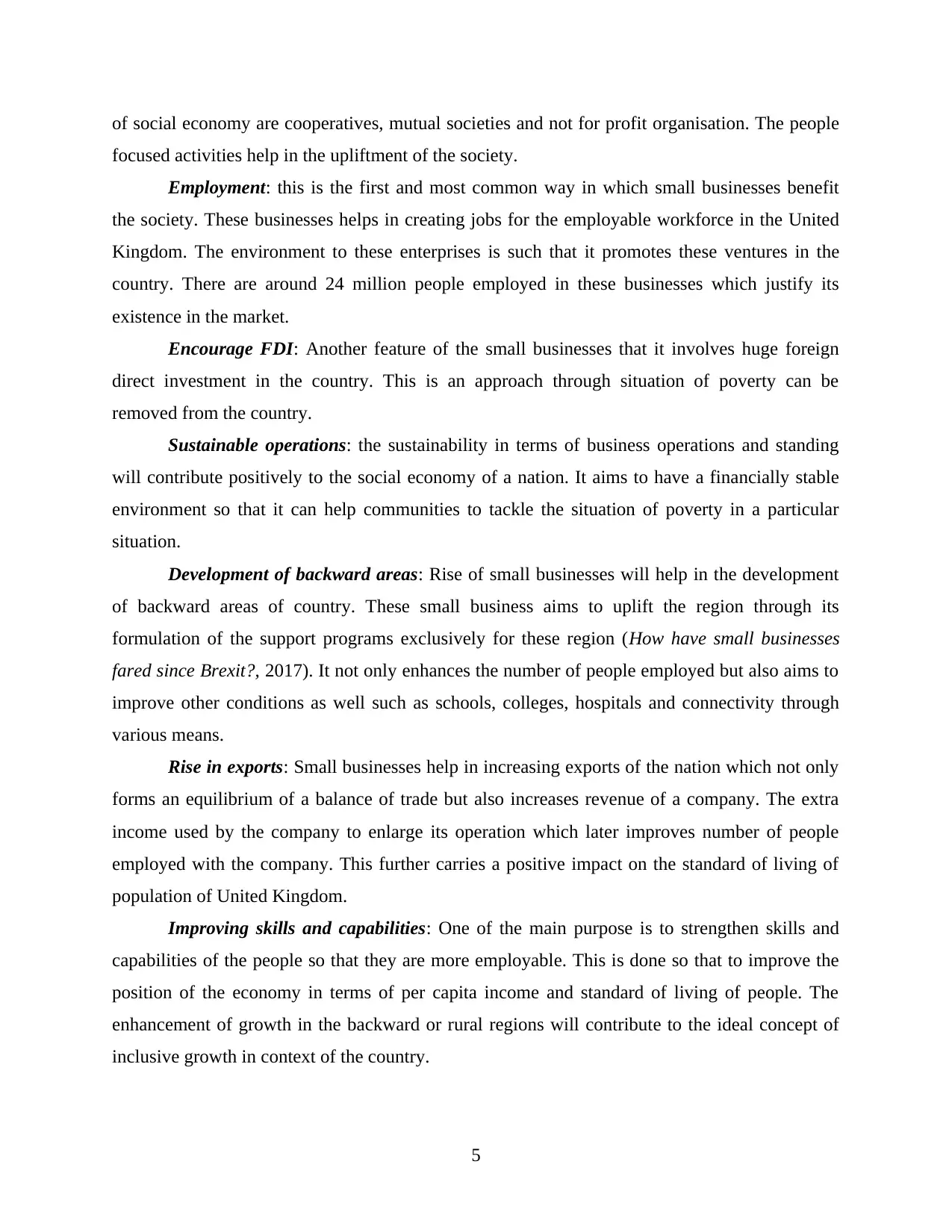
of social economy are cooperatives, mutual societies and not for profit organisation. The people
focused activities help in the upliftment of the society.
Employment: this is the first and most common way in which small businesses benefit
the society. These businesses helps in creating jobs for the employable workforce in the United
Kingdom. The environment to these enterprises is such that it promotes these ventures in the
country. There are around 24 million people employed in these businesses which justify its
existence in the market.
Encourage FDI: Another feature of the small businesses that it involves huge foreign
direct investment in the country. This is an approach through situation of poverty can be
removed from the country.
Sustainable operations: the sustainability in terms of business operations and standing
will contribute positively to the social economy of a nation. It aims to have a financially stable
environment so that it can help communities to tackle the situation of poverty in a particular
situation.
Development of backward areas: Rise of small businesses will help in the development
of backward areas of country. These small business aims to uplift the region through its
formulation of the support programs exclusively for these region (How have small businesses
fared since Brexit?, 2017). It not only enhances the number of people employed but also aims to
improve other conditions as well such as schools, colleges, hospitals and connectivity through
various means.
Rise in exports: Small businesses help in increasing exports of the nation which not only
forms an equilibrium of a balance of trade but also increases revenue of a company. The extra
income used by the company to enlarge its operation which later improves number of people
employed with the company. This further carries a positive impact on the standard of living of
population of United Kingdom.
Improving skills and capabilities: One of the main purpose is to strengthen skills and
capabilities of the people so that they are more employable. This is done so that to improve the
position of the economy in terms of per capita income and standard of living of people. The
enhancement of growth in the backward or rural regions will contribute to the ideal concept of
inclusive growth in context of the country.
5
focused activities help in the upliftment of the society.
Employment: this is the first and most common way in which small businesses benefit
the society. These businesses helps in creating jobs for the employable workforce in the United
Kingdom. The environment to these enterprises is such that it promotes these ventures in the
country. There are around 24 million people employed in these businesses which justify its
existence in the market.
Encourage FDI: Another feature of the small businesses that it involves huge foreign
direct investment in the country. This is an approach through situation of poverty can be
removed from the country.
Sustainable operations: the sustainability in terms of business operations and standing
will contribute positively to the social economy of a nation. It aims to have a financially stable
environment so that it can help communities to tackle the situation of poverty in a particular
situation.
Development of backward areas: Rise of small businesses will help in the development
of backward areas of country. These small business aims to uplift the region through its
formulation of the support programs exclusively for these region (How have small businesses
fared since Brexit?, 2017). It not only enhances the number of people employed but also aims to
improve other conditions as well such as schools, colleges, hospitals and connectivity through
various means.
Rise in exports: Small businesses help in increasing exports of the nation which not only
forms an equilibrium of a balance of trade but also increases revenue of a company. The extra
income used by the company to enlarge its operation which later improves number of people
employed with the company. This further carries a positive impact on the standard of living of
population of United Kingdom.
Improving skills and capabilities: One of the main purpose is to strengthen skills and
capabilities of the people so that they are more employable. This is done so that to improve the
position of the economy in terms of per capita income and standard of living of people. The
enhancement of growth in the backward or rural regions will contribute to the ideal concept of
inclusive growth in context of the country.
5
Paraphrase This Document
Need a fresh take? Get an instant paraphrase of this document with our AI Paraphraser
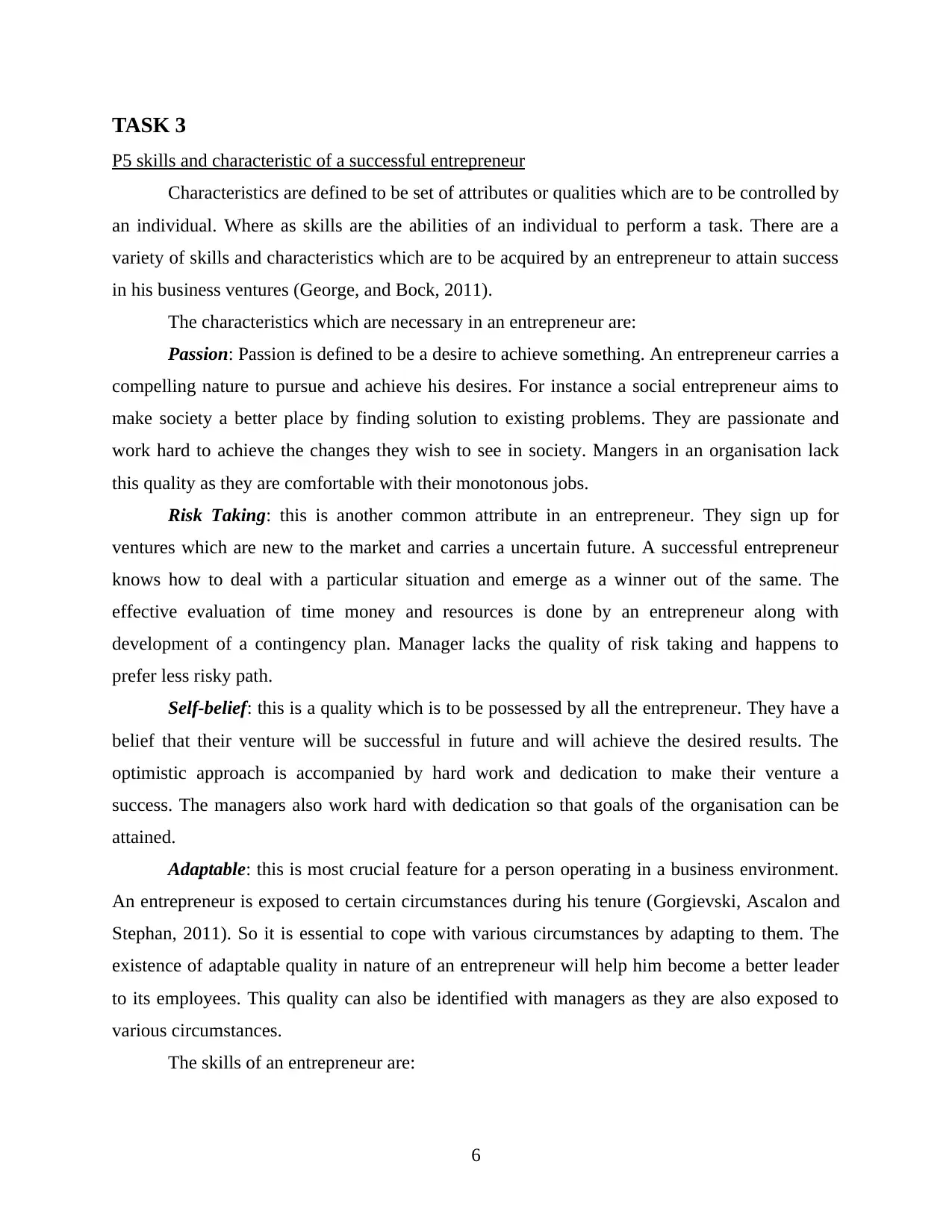
TASK 3
P5 skills and characteristic of a successful entrepreneur
Characteristics are defined to be set of attributes or qualities which are to be controlled by
an individual. Where as skills are the abilities of an individual to perform a task. There are a
variety of skills and characteristics which are to be acquired by an entrepreneur to attain success
in his business ventures (George, and Bock, 2011).
The characteristics which are necessary in an entrepreneur are:
Passion: Passion is defined to be a desire to achieve something. An entrepreneur carries a
compelling nature to pursue and achieve his desires. For instance a social entrepreneur aims to
make society a better place by finding solution to existing problems. They are passionate and
work hard to achieve the changes they wish to see in society. Mangers in an organisation lack
this quality as they are comfortable with their monotonous jobs.
Risk Taking: this is another common attribute in an entrepreneur. They sign up for
ventures which are new to the market and carries a uncertain future. A successful entrepreneur
knows how to deal with a particular situation and emerge as a winner out of the same. The
effective evaluation of time money and resources is done by an entrepreneur along with
development of a contingency plan. Manager lacks the quality of risk taking and happens to
prefer less risky path.
Self-belief: this is a quality which is to be possessed by all the entrepreneur. They have a
belief that their venture will be successful in future and will achieve the desired results. The
optimistic approach is accompanied by hard work and dedication to make their venture a
success. The managers also work hard with dedication so that goals of the organisation can be
attained.
Adaptable: this is most crucial feature for a person operating in a business environment.
An entrepreneur is exposed to certain circumstances during his tenure (Gorgievski, Ascalon and
Stephan, 2011). So it is essential to cope with various circumstances by adapting to them. The
existence of adaptable quality in nature of an entrepreneur will help him become a better leader
to its employees. This quality can also be identified with managers as they are also exposed to
various circumstances.
The skills of an entrepreneur are:
6
P5 skills and characteristic of a successful entrepreneur
Characteristics are defined to be set of attributes or qualities which are to be controlled by
an individual. Where as skills are the abilities of an individual to perform a task. There are a
variety of skills and characteristics which are to be acquired by an entrepreneur to attain success
in his business ventures (George, and Bock, 2011).
The characteristics which are necessary in an entrepreneur are:
Passion: Passion is defined to be a desire to achieve something. An entrepreneur carries a
compelling nature to pursue and achieve his desires. For instance a social entrepreneur aims to
make society a better place by finding solution to existing problems. They are passionate and
work hard to achieve the changes they wish to see in society. Mangers in an organisation lack
this quality as they are comfortable with their monotonous jobs.
Risk Taking: this is another common attribute in an entrepreneur. They sign up for
ventures which are new to the market and carries a uncertain future. A successful entrepreneur
knows how to deal with a particular situation and emerge as a winner out of the same. The
effective evaluation of time money and resources is done by an entrepreneur along with
development of a contingency plan. Manager lacks the quality of risk taking and happens to
prefer less risky path.
Self-belief: this is a quality which is to be possessed by all the entrepreneur. They have a
belief that their venture will be successful in future and will achieve the desired results. The
optimistic approach is accompanied by hard work and dedication to make their venture a
success. The managers also work hard with dedication so that goals of the organisation can be
attained.
Adaptable: this is most crucial feature for a person operating in a business environment.
An entrepreneur is exposed to certain circumstances during his tenure (Gorgievski, Ascalon and
Stephan, 2011). So it is essential to cope with various circumstances by adapting to them. The
existence of adaptable quality in nature of an entrepreneur will help him become a better leader
to its employees. This quality can also be identified with managers as they are also exposed to
various circumstances.
The skills of an entrepreneur are:
6
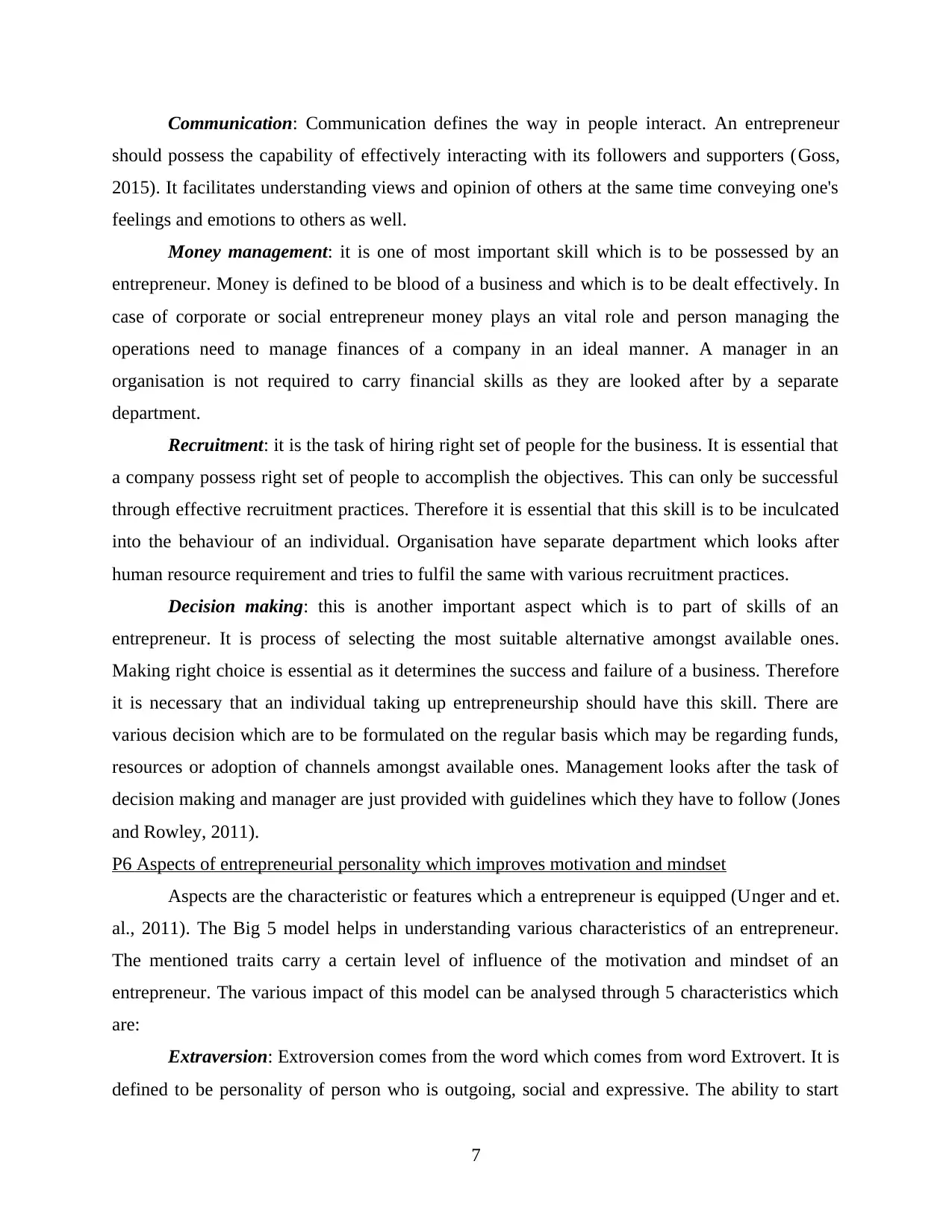
Communication: Communication defines the way in people interact. An entrepreneur
should possess the capability of effectively interacting with its followers and supporters (Goss,
2015). It facilitates understanding views and opinion of others at the same time conveying one's
feelings and emotions to others as well.
Money management: it is one of most important skill which is to be possessed by an
entrepreneur. Money is defined to be blood of a business and which is to be dealt effectively. In
case of corporate or social entrepreneur money plays an vital role and person managing the
operations need to manage finances of a company in an ideal manner. A manager in an
organisation is not required to carry financial skills as they are looked after by a separate
department.
Recruitment: it is the task of hiring right set of people for the business. It is essential that
a company possess right set of people to accomplish the objectives. This can only be successful
through effective recruitment practices. Therefore it is essential that this skill is to be inculcated
into the behaviour of an individual. Organisation have separate department which looks after
human resource requirement and tries to fulfil the same with various recruitment practices.
Decision making: this is another important aspect which is to part of skills of an
entrepreneur. It is process of selecting the most suitable alternative amongst available ones.
Making right choice is essential as it determines the success and failure of a business. Therefore
it is necessary that an individual taking up entrepreneurship should have this skill. There are
various decision which are to be formulated on the regular basis which may be regarding funds,
resources or adoption of channels amongst available ones. Management looks after the task of
decision making and manager are just provided with guidelines which they have to follow (Jones
and Rowley, 2011).
P6 Aspects of entrepreneurial personality which improves motivation and mindset
Aspects are the characteristic or features which a entrepreneur is equipped (Unger and et.
al., 2011). The Big 5 model helps in understanding various characteristics of an entrepreneur.
The mentioned traits carry a certain level of influence of the motivation and mindset of an
entrepreneur. The various impact of this model can be analysed through 5 characteristics which
are:
Extraversion: Extroversion comes from the word which comes from word Extrovert. It is
defined to be personality of person who is outgoing, social and expressive. The ability to start
7
should possess the capability of effectively interacting with its followers and supporters (Goss,
2015). It facilitates understanding views and opinion of others at the same time conveying one's
feelings and emotions to others as well.
Money management: it is one of most important skill which is to be possessed by an
entrepreneur. Money is defined to be blood of a business and which is to be dealt effectively. In
case of corporate or social entrepreneur money plays an vital role and person managing the
operations need to manage finances of a company in an ideal manner. A manager in an
organisation is not required to carry financial skills as they are looked after by a separate
department.
Recruitment: it is the task of hiring right set of people for the business. It is essential that
a company possess right set of people to accomplish the objectives. This can only be successful
through effective recruitment practices. Therefore it is essential that this skill is to be inculcated
into the behaviour of an individual. Organisation have separate department which looks after
human resource requirement and tries to fulfil the same with various recruitment practices.
Decision making: this is another important aspect which is to part of skills of an
entrepreneur. It is process of selecting the most suitable alternative amongst available ones.
Making right choice is essential as it determines the success and failure of a business. Therefore
it is necessary that an individual taking up entrepreneurship should have this skill. There are
various decision which are to be formulated on the regular basis which may be regarding funds,
resources or adoption of channels amongst available ones. Management looks after the task of
decision making and manager are just provided with guidelines which they have to follow (Jones
and Rowley, 2011).
P6 Aspects of entrepreneurial personality which improves motivation and mindset
Aspects are the characteristic or features which a entrepreneur is equipped (Unger and et.
al., 2011). The Big 5 model helps in understanding various characteristics of an entrepreneur.
The mentioned traits carry a certain level of influence of the motivation and mindset of an
entrepreneur. The various impact of this model can be analysed through 5 characteristics which
are:
Extraversion: Extroversion comes from the word which comes from word Extrovert. It is
defined to be personality of person who is outgoing, social and expressive. The ability to start
7
⊘ This is a preview!⊘
Do you want full access?
Subscribe today to unlock all pages.

Trusted by 1+ million students worldwide
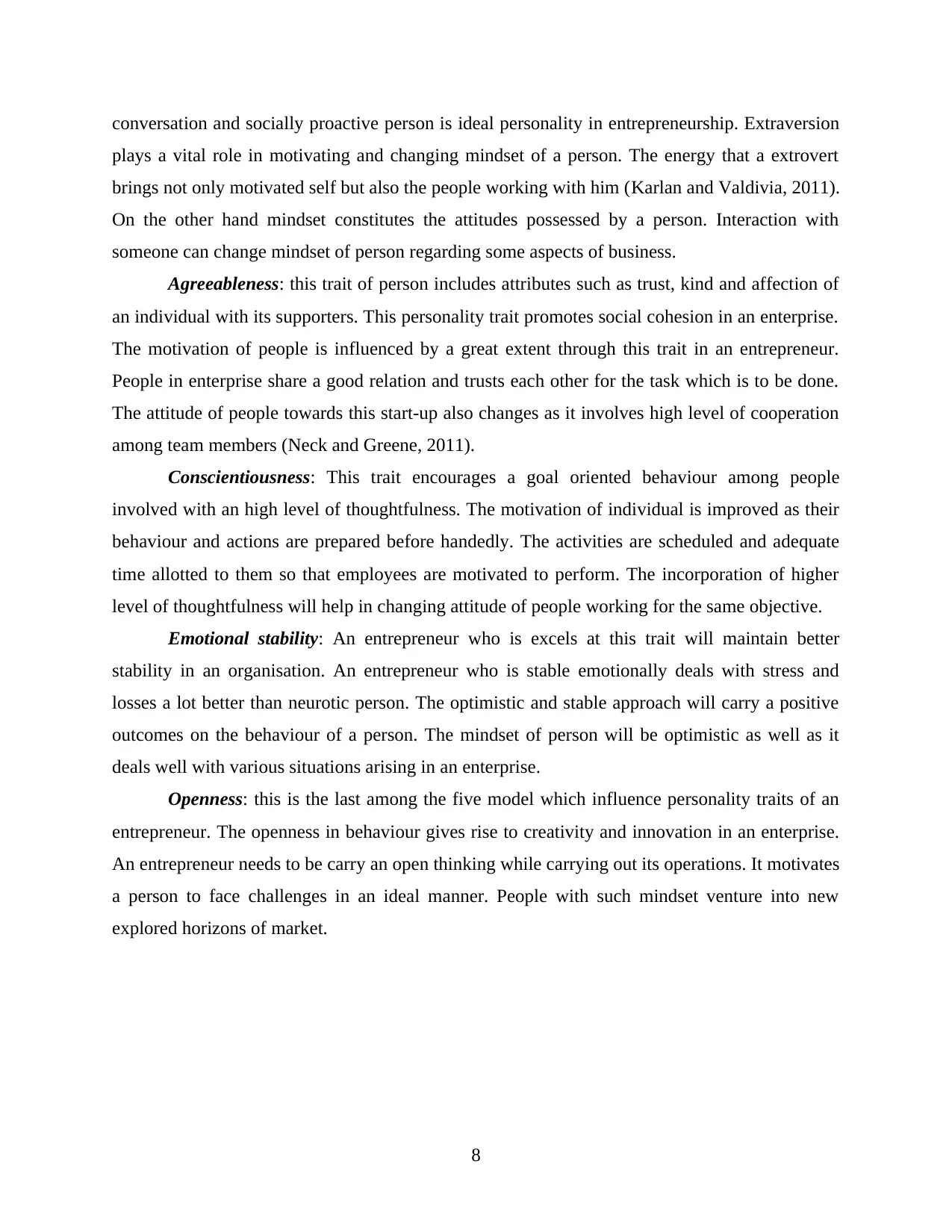
conversation and socially proactive person is ideal personality in entrepreneurship. Extraversion
plays a vital role in motivating and changing mindset of a person. The energy that a extrovert
brings not only motivated self but also the people working with him (Karlan and Valdivia, 2011).
On the other hand mindset constitutes the attitudes possessed by a person. Interaction with
someone can change mindset of person regarding some aspects of business.
Agreeableness: this trait of person includes attributes such as trust, kind and affection of
an individual with its supporters. This personality trait promotes social cohesion in an enterprise.
The motivation of people is influenced by a great extent through this trait in an entrepreneur.
People in enterprise share a good relation and trusts each other for the task which is to be done.
The attitude of people towards this start-up also changes as it involves high level of cooperation
among team members (Neck and Greene, 2011).
Conscientiousness: This trait encourages a goal oriented behaviour among people
involved with an high level of thoughtfulness. The motivation of individual is improved as their
behaviour and actions are prepared before handedly. The activities are scheduled and adequate
time allotted to them so that employees are motivated to perform. The incorporation of higher
level of thoughtfulness will help in changing attitude of people working for the same objective.
Emotional stability: An entrepreneur who is excels at this trait will maintain better
stability in an organisation. An entrepreneur who is stable emotionally deals with stress and
losses a lot better than neurotic person. The optimistic and stable approach will carry a positive
outcomes on the behaviour of a person. The mindset of person will be optimistic as well as it
deals well with various situations arising in an enterprise.
Openness: this is the last among the five model which influence personality traits of an
entrepreneur. The openness in behaviour gives rise to creativity and innovation in an enterprise.
An entrepreneur needs to be carry an open thinking while carrying out its operations. It motivates
a person to face challenges in an ideal manner. People with such mindset venture into new
explored horizons of market.
8
plays a vital role in motivating and changing mindset of a person. The energy that a extrovert
brings not only motivated self but also the people working with him (Karlan and Valdivia, 2011).
On the other hand mindset constitutes the attitudes possessed by a person. Interaction with
someone can change mindset of person regarding some aspects of business.
Agreeableness: this trait of person includes attributes such as trust, kind and affection of
an individual with its supporters. This personality trait promotes social cohesion in an enterprise.
The motivation of people is influenced by a great extent through this trait in an entrepreneur.
People in enterprise share a good relation and trusts each other for the task which is to be done.
The attitude of people towards this start-up also changes as it involves high level of cooperation
among team members (Neck and Greene, 2011).
Conscientiousness: This trait encourages a goal oriented behaviour among people
involved with an high level of thoughtfulness. The motivation of individual is improved as their
behaviour and actions are prepared before handedly. The activities are scheduled and adequate
time allotted to them so that employees are motivated to perform. The incorporation of higher
level of thoughtfulness will help in changing attitude of people working for the same objective.
Emotional stability: An entrepreneur who is excels at this trait will maintain better
stability in an organisation. An entrepreneur who is stable emotionally deals with stress and
losses a lot better than neurotic person. The optimistic and stable approach will carry a positive
outcomes on the behaviour of a person. The mindset of person will be optimistic as well as it
deals well with various situations arising in an enterprise.
Openness: this is the last among the five model which influence personality traits of an
entrepreneur. The openness in behaviour gives rise to creativity and innovation in an enterprise.
An entrepreneur needs to be carry an open thinking while carrying out its operations. It motivates
a person to face challenges in an ideal manner. People with such mindset venture into new
explored horizons of market.
8
Paraphrase This Document
Need a fresh take? Get an instant paraphrase of this document with our AI Paraphraser
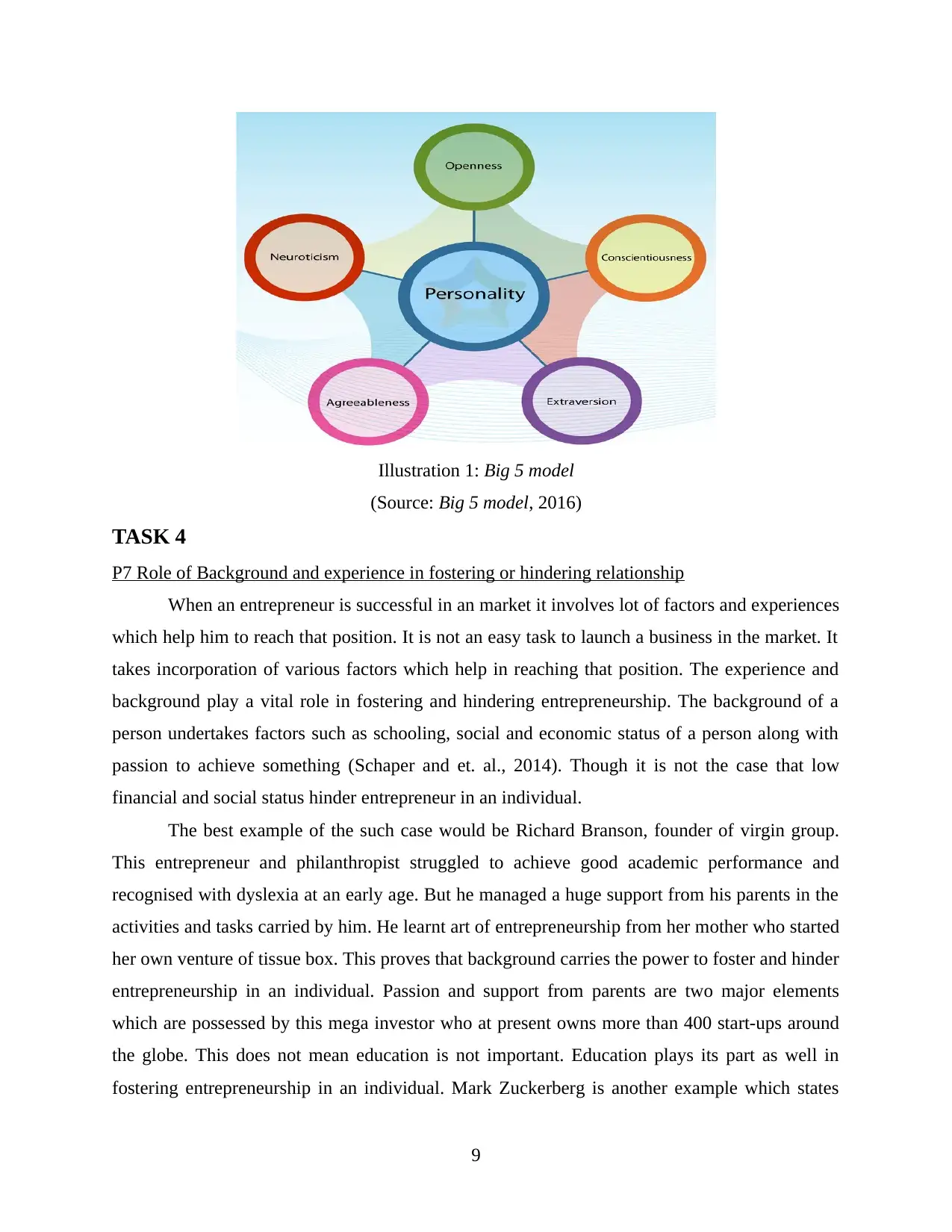
(Source: Big 5 model, 2016)
TASK 4
P7 Role of Background and experience in fostering or hindering relationship
When an entrepreneur is successful in an market it involves lot of factors and experiences
which help him to reach that position. It is not an easy task to launch a business in the market. It
takes incorporation of various factors which help in reaching that position. The experience and
background play a vital role in fostering and hindering entrepreneurship. The background of a
person undertakes factors such as schooling, social and economic status of a person along with
passion to achieve something (Schaper and et. al., 2014). Though it is not the case that low
financial and social status hinder entrepreneur in an individual.
The best example of the such case would be Richard Branson, founder of virgin group.
This entrepreneur and philanthropist struggled to achieve good academic performance and
recognised with dyslexia at an early age. But he managed a huge support from his parents in the
activities and tasks carried by him. He learnt art of entrepreneurship from her mother who started
her own venture of tissue box. This proves that background carries the power to foster and hinder
entrepreneurship in an individual. Passion and support from parents are two major elements
which are possessed by this mega investor who at present owns more than 400 start-ups around
the globe. This does not mean education is not important. Education plays its part as well in
fostering entrepreneurship in an individual. Mark Zuckerberg is another example which states
9
Illustration 1: Big 5 model
TASK 4
P7 Role of Background and experience in fostering or hindering relationship
When an entrepreneur is successful in an market it involves lot of factors and experiences
which help him to reach that position. It is not an easy task to launch a business in the market. It
takes incorporation of various factors which help in reaching that position. The experience and
background play a vital role in fostering and hindering entrepreneurship. The background of a
person undertakes factors such as schooling, social and economic status of a person along with
passion to achieve something (Schaper and et. al., 2014). Though it is not the case that low
financial and social status hinder entrepreneur in an individual.
The best example of the such case would be Richard Branson, founder of virgin group.
This entrepreneur and philanthropist struggled to achieve good academic performance and
recognised with dyslexia at an early age. But he managed a huge support from his parents in the
activities and tasks carried by him. He learnt art of entrepreneurship from her mother who started
her own venture of tissue box. This proves that background carries the power to foster and hinder
entrepreneurship in an individual. Passion and support from parents are two major elements
which are possessed by this mega investor who at present owns more than 400 start-ups around
the globe. This does not mean education is not important. Education plays its part as well in
fostering entrepreneurship in an individual. Mark Zuckerberg is another example which states
9
Illustration 1: Big 5 model
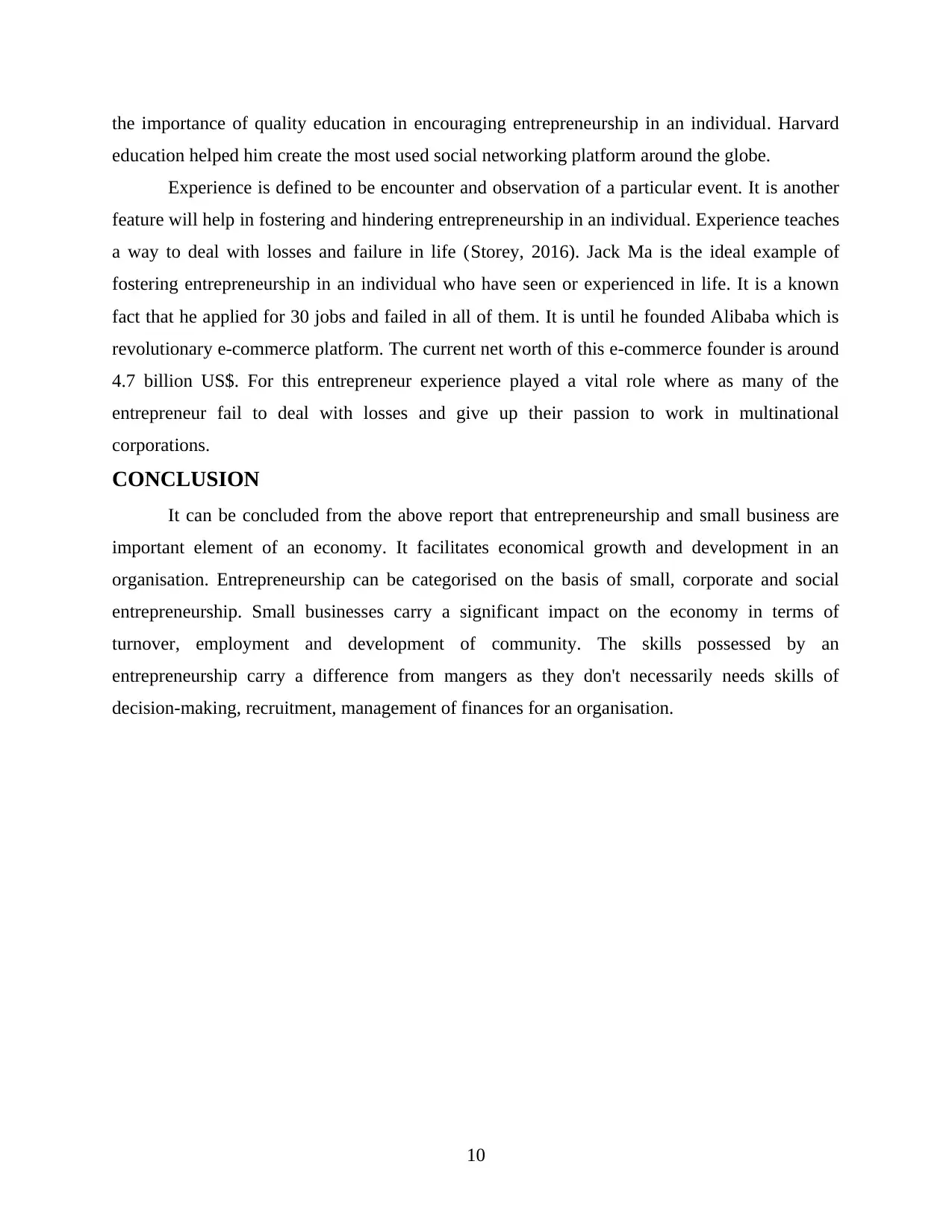
the importance of quality education in encouraging entrepreneurship in an individual. Harvard
education helped him create the most used social networking platform around the globe.
Experience is defined to be encounter and observation of a particular event. It is another
feature will help in fostering and hindering entrepreneurship in an individual. Experience teaches
a way to deal with losses and failure in life (Storey, 2016). Jack Ma is the ideal example of
fostering entrepreneurship in an individual who have seen or experienced in life. It is a known
fact that he applied for 30 jobs and failed in all of them. It is until he founded Alibaba which is
revolutionary e-commerce platform. The current net worth of this e-commerce founder is around
4.7 billion US$. For this entrepreneur experience played a vital role where as many of the
entrepreneur fail to deal with losses and give up their passion to work in multinational
corporations.
CONCLUSION
It can be concluded from the above report that entrepreneurship and small business are
important element of an economy. It facilitates economical growth and development in an
organisation. Entrepreneurship can be categorised on the basis of small, corporate and social
entrepreneurship. Small businesses carry a significant impact on the economy in terms of
turnover, employment and development of community. The skills possessed by an
entrepreneurship carry a difference from mangers as they don't necessarily needs skills of
decision-making, recruitment, management of finances for an organisation.
10
education helped him create the most used social networking platform around the globe.
Experience is defined to be encounter and observation of a particular event. It is another
feature will help in fostering and hindering entrepreneurship in an individual. Experience teaches
a way to deal with losses and failure in life (Storey, 2016). Jack Ma is the ideal example of
fostering entrepreneurship in an individual who have seen or experienced in life. It is a known
fact that he applied for 30 jobs and failed in all of them. It is until he founded Alibaba which is
revolutionary e-commerce platform. The current net worth of this e-commerce founder is around
4.7 billion US$. For this entrepreneur experience played a vital role where as many of the
entrepreneur fail to deal with losses and give up their passion to work in multinational
corporations.
CONCLUSION
It can be concluded from the above report that entrepreneurship and small business are
important element of an economy. It facilitates economical growth and development in an
organisation. Entrepreneurship can be categorised on the basis of small, corporate and social
entrepreneurship. Small businesses carry a significant impact on the economy in terms of
turnover, employment and development of community. The skills possessed by an
entrepreneurship carry a difference from mangers as they don't necessarily needs skills of
decision-making, recruitment, management of finances for an organisation.
10
⊘ This is a preview!⊘
Do you want full access?
Subscribe today to unlock all pages.

Trusted by 1+ million students worldwide
1 out of 14
Related Documents
Your All-in-One AI-Powered Toolkit for Academic Success.
+13062052269
info@desklib.com
Available 24*7 on WhatsApp / Email
![[object Object]](/_next/static/media/star-bottom.7253800d.svg)
Unlock your academic potential
Copyright © 2020–2026 A2Z Services. All Rights Reserved. Developed and managed by ZUCOL.





